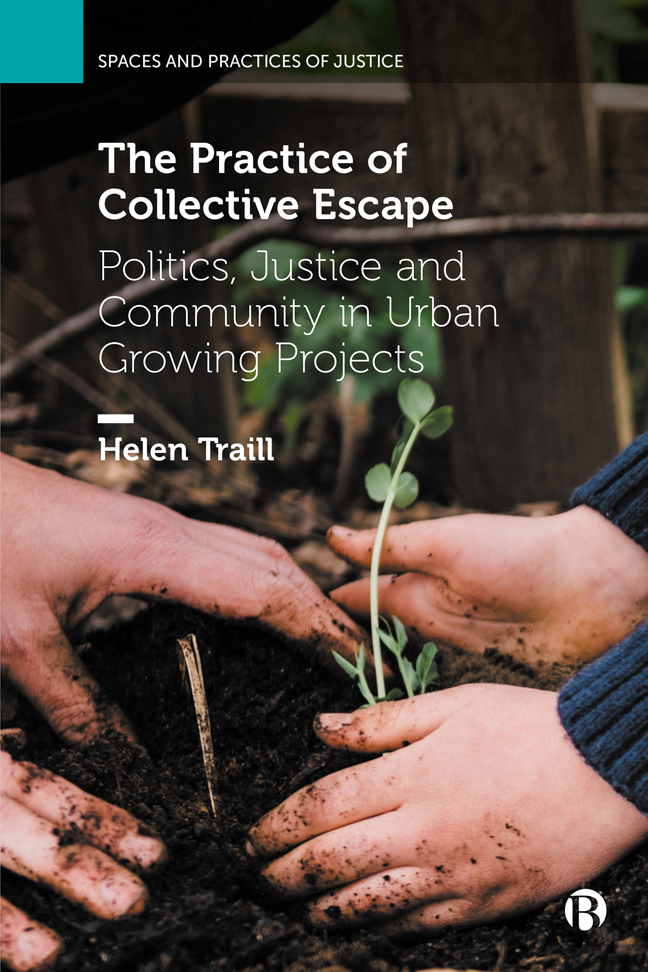Book contents
- Frontmatter
- Dedication
- Contents
- Series Preface
- Acknowledgements
- 1 Introduction
- 2 Urban Growing in Glasgow
- 3 The Rhythms of Urban Escape
- 4 Who Gets to Escape?
- 5 Ownership, Autonomy and the Commons
- 6 Escape into Responsibility
- 7 Field Dynamics and Strategic Neutrality
- 8 The Political Imagination of Common Justice
- 9 Escape, Crisis and Social Change
- 10 Conclusion
- Notes
- References
- Index
8 - The Political Imagination of Common Justice
Published online by Cambridge University Press: 23 January 2024
- Frontmatter
- Dedication
- Contents
- Series Preface
- Acknowledgements
- 1 Introduction
- 2 Urban Growing in Glasgow
- 3 The Rhythms of Urban Escape
- 4 Who Gets to Escape?
- 5 Ownership, Autonomy and the Commons
- 6 Escape into Responsibility
- 7 Field Dynamics and Strategic Neutrality
- 8 The Political Imagination of Common Justice
- 9 Escape, Crisis and Social Change
- 10 Conclusion
- Notes
- References
- Index
Summary
Ambiguity, interpretations and imaginations
One of the myriad reasons to take the politics of communal growing projects as an empirical puzzle relates to the breadth of interpretation of the case studies. This vexes any easy conceptualization of the projects as political or not, without asserting that participants are wrong in their understanding of their action. This is to say that irreconcilable attitudes exist between participants’ views of the projects as completely political, as totally apolitical or somewhere fuzzy in between. I discuss this as the political imagination of the sites, in order to capture the interrelation of participants’ understanding of the sites and their broader concept of what politics means. That a space exists between an understanding of communal growing as commoning and productive of an autonomous space in the city; the strategic neutrality at an organizational level; and a multitude of subjective understandings of politics illuminates some of the challenge, and often operatively fuzzy nature, of collective escape. Some of the productive ambiguity within escape as a concept sits precisely in this muddle of political interpretations, in opening up a space that is fluidly understood and governed to a degree by autonomously negotiated cultures and dynamics.
That communal growing can be both deeply political for some and apolitical for others was indeed partly a question of different conceptions of politics itself in the field. Some were drawing on a broader, feminist-inflected sense of everyday life as political, while others purely identified politics with different levels of the state (local council, Scottish Government, UK Government) and the political party structure. The difference in interpretation was spread across both sites and also related to personal trajectories, project involvement and experiences of protest and politics. This recalls Nettle's argument that: ‘As in many social movements, community gardeners’ collectivity is plural, ambivalent and often contradictory (Melucci, 1996) and does not necessarily coalesce around a clearly articulated political philosophy or model of change’ (Nettle, 2014, p 170). The empirical variation in the political interpretation of communal growing confirmed this plurality, but one commonality emerged: the importance of the spaces themselves and their transformative potential. That transformation is at times imagined apolitically is a notable empirical artifact that requires some exploration; though it recalls the sense from the previous chapter that a commons is often more an analytical label than a lay category (de Angelis, 2017).
- Type
- Chapter
- Information
- The Practice of Collective EscapePolitics, Justice and Community in Urban Growing Projects, pp. 125 - 138Publisher: Bristol University PressPrint publication year: 2023

